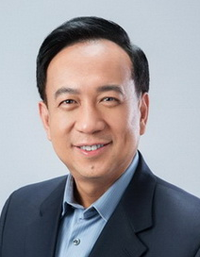Chen Dong
Updated: 2021-09-06

PH.D., Professor, CASM
Shanghai Jiao Tong University School of Medicine
Resume
Dong graduated from Wuhan University with a bachelor's degree in 1989, and received a Ph.D. from the University of Alabama at Birmingham in 1996. From 1997 to 2000, he worked as a postdoctoral fellow in the Department of Immunology at Yale University. He used to work in Immunology at the MD Anderson Cancer Center of the University of Texas in the United States. After returning to work, he was the Dean of the School of Medicine of Tsinghua University. He is currently a professor at the School of Medicine of Shanghai Jiaotong University.
Research interest
Academician Dong Chen is mainly devoted to the research of immunology, and has made a number of pioneering contributions in the field of T cell differentiation and autoimmune diseases. His research has brought a profound impact on the treatment of immune diseases and also provided new ideas for tumor immunotherapy. Ideas. Academician Dong Chen has published more than 200 papers, with a total of more than 28,000 citations. From 2014 to 2019, he was named the "Highly Cited Scientist" in the world for six consecutive years. Academician Dong Chen is a fellow of the American Association for the Advancement of Science and an academician of the Chinese Academy of Sciences. He has won the 2009 American Society of Immunologists BD Bioscience Investigator Award and the 2019 International Cytokine and Interferon Association Biolegend-William E. Paul Award. He is the project leader of the National Key R&D Precision Medicine Program, and the leader of the "Inflammatory Biology and Disease" innovation group of the National Foundation of China Foundation of China. He is currently the editor-in-chief of Frontiers in Immunology•T Cell Biology, the associate editor of China Science•Life Sciences, and the editorial board of Immunity, Cell Research and other journals.
Selected Publications
1. Ni, L., Ye, F., Cheng, M.-L., Feng, Y., Deng, Y.-Q., Zhao, H., Wei, P., Ge, J., Gou, M., Li, X., Sun, L., Cao, T., Wang, P., Zhou, C., Zhang, R., Liang, P., Guo, H., Wang, X., Qin, C.-F., Chen, F. and Dong, C. Characterization of anti-viral immunity in recovered individuals infected by SARS-CoV-2. (2020) Immunity. In press.
2. Wang, X., Ni, L., Wan, S., Zhao, X., Ding, X., Dejean, A. and Dong, C. Febrile Temperature Critically Controls the Differentiation and Pathogenicity of T Helper 17 Cells. (2020) Immunity. 52:328-341.
3. Xu, W., Zhao, X., Wang, X., Feng, H., Gou, M., Jin, W., Wang, X., Liu, X. and Dong, C. The transcription factor Tox2 drives T follicular helper cell development via regulating chromatin accessibility. (2019) Immunity. 51:826-839
4. Su, Y., Huang, J., Zhao, X., Lu, H., Wang, W., Yang, X. O., Shi, Y., Wang, X., Lai, Y. and Dong, C. (2019) Interleukin-17 receptor D constitutes an alternative receptor for interleukin-17A important in psoriasis-like skin inflammation. (2019) Science Immunology. 4:36.
5. Liu, X.,Wang, Y., Lu, H., Li, J., Yan, X., Xiao, M., Hao, J., Hoang, O. N., Khong, H., Chen, T., Huang, R., Wu, J., Zhao, Q., Wu, Q., Xu, S., Wang, X., Jin, W., Yu, S., Wang, Y., Wei, L., Wang, A., Zhong, B., Ni, L., Liu, X., Nurieva, R., Ye, L., Tian, Q., Bian, X.-W. and Dong, C. Genome-wide analysis identifies Nr4a1 as a key mediator of T cell dysfunction. (2019) Nature. 567:525-529.
6. Xu, M., Lu, H., Wu, Y., Liu, K., Shi, Y., An, H., Zhang, J., Wang, X., Lai, Y. and Dong, C. An IL-25-mediated autoregulatory circuit in keratinocytes plays a pivotal role in psoriatic skin inflammation. (2018) Immunity. 48:787-798
7. Li, J., Lee, Y., Li, Y., Jiang, Y., Lu, H., Zang, W., Zhao, X., Liu, L., Chen, Y., Tan, H., Yang, Z., Zhang, M. Q., Mak, T. W., Ni, L. and Dong, C. Co-inhibitory molecule B7 superfamily member 1 expressed by tumor-infiltrating myeloid cells induces dysfunction of anti-tumor CD8+ T cells. (2018) Immunity. 48:773-786
8. Jiang, Y., Liu, Y., Lu, H., Sun, S.-C., Jin, W., Wang, X. and Dong, C. Epigenetic activation during T helper 17 (Th17) cell differentiation is mediated by Tripartite motif containing 28. (2018) Nature Communications. 9:1424.
9. Fu, W., Liu, X., Lin, X., Feng, H., Sun, L., Li, S., Chen, H., Tang, H., Lu, L., Jin, W. and Dong, C. Deficiency in T follicular regulatory cells promotes autoimmunity. (2018) Journal of Experimental Medicine. 215:815-825.
